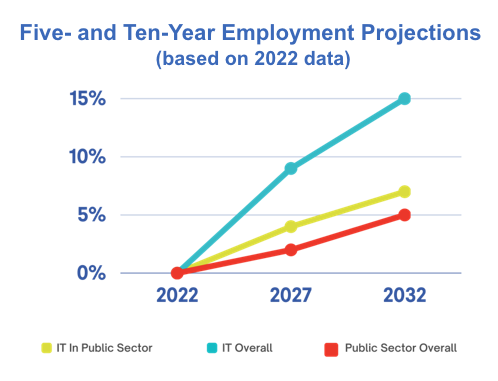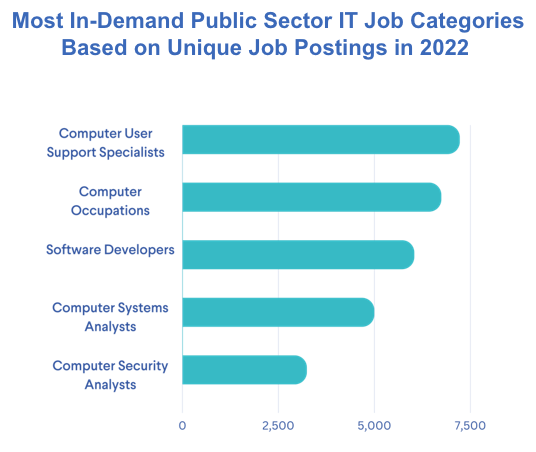Hiring for IT roles in the public sector has its challenges, but it’s also ripe with opportunity. Meaningful partnerships between government, private sector, and nonprofit organizations can create new career pipelines that address digital skills gaps.
News of job cuts and layoffs continue to dominate headlines—especially within big technology firms; however, the overall economy remains strong and shows consistent signs of growth, with technology careers predicted to remain in high demand for the years ahead. Jobseekers pursuing technology careers in areas such as data analytics, cybersecurity, user experience design (UX), digital marketing, and automation have ample opportunity to deploy their skills in a variety of industries. Take the public sector, for example, which is comprised of employment positions at the federal, state, and/or local government agency level. Once an overlooked entry point for IT professionals, the public sector is moving into the spotlight as more students are considering careers in public service, thanks to recent efforts by federal, state, and local governments to attract diverse tech talent and improve digital-first experiences for the people they serve.
With support from Google.org, Jobs for the Future (JFF) is pleased to share lessons learned from state government agencies and local workforce development boards that are removing barriers to public sector employment and proactively building career pathways for individuals to chart a path in public service.

Making the Case for a Career in Public Service
When competing against well-resourced, private tech companies, public sector hiring teams struggle to market careers in public service as an attractive option for tech workers. The public sector might be top of mind for education and law enforcement professionals, but it is perhaps overlooked by those seeking employment in roles more commonly found in private-sector industries, such as IT support specialists, software engineers, and cybersecurity analysts. Jobseekers with transferrable digital skills may not realize the ample opportunities available in their local, state, and federal agencies and how they can lend their talents to improving their communities.

Public sector careers also provide many of the benefits that today’s jobseekers have come to expect, including holidays, paid time off, retirement plans, comprehensive health insurance, wellness programs, and flexible/remote work arrangements. In fact, employees who value work-life balance and job stability may find great satisfaction working in the public sector, which often has regulations around overtime hours and offers protections for the 33.1% of civil servants who belong to labor unions. In a time where skills development is key to attracting and retaining employees, public sector organizations provide employees a path to grow with consistent schedules, on-the-job learning, and professional development. This is in addition to unique employee benefits such as the Public Service Loan Forgiveness Program, which provides loan repayment assistance for workers who take on loans for education to learn new skills and/or earn a degree. Last but not least, for workers seeking a sense of pride and fulfillment, the public sector can be a way to give back to their communities in a meaningful way.
Building Career Pathways Into Public Sector Digital Jobs
The benefits of a career in the public sector are clear, with agencies across all levels of government committed to attracting top talent, offering competitive employee benefits, working to reduce existing hiring barriers, and strategizing how to build a workforce that supports digital-first government services.
A major focus of all grantees in the Public Sector Digital Jobs Innovation Project is emphasizing skills-based hiring and the use of short-term credentials to create on-ramps to digital jobs. Further, we know that attainable career pathways create high-quality talent pipelines when paired with industry-recognized training programs and immersive work-based learning opportunities, such as apprenticeships, pre-apprenticeships, internships, and on-the-job training. This strategy is also demonstrated in the work currently underway by planning grantees in the Public Sector Digital Jobs Innovation Project.
In North Carolina, the Office of Governor Roy Cooper is building career pathways by identifying online trainings and short-term credentials that can be embedded into a broader public sector digital jobs model. This includes partnerships with high schools and community colleges to create apprenticeship and pre-apprenticeship programs. The importance of emphasizing skills-based hiring for state roles was made clear in March 2023, when Governor Cooper signed an executive order to jumpstart the efforts. The order allows North Carolina residents to substitute work experience for degree requirements and encourages qualified candidates without a four-year degree to apply for state jobs.




